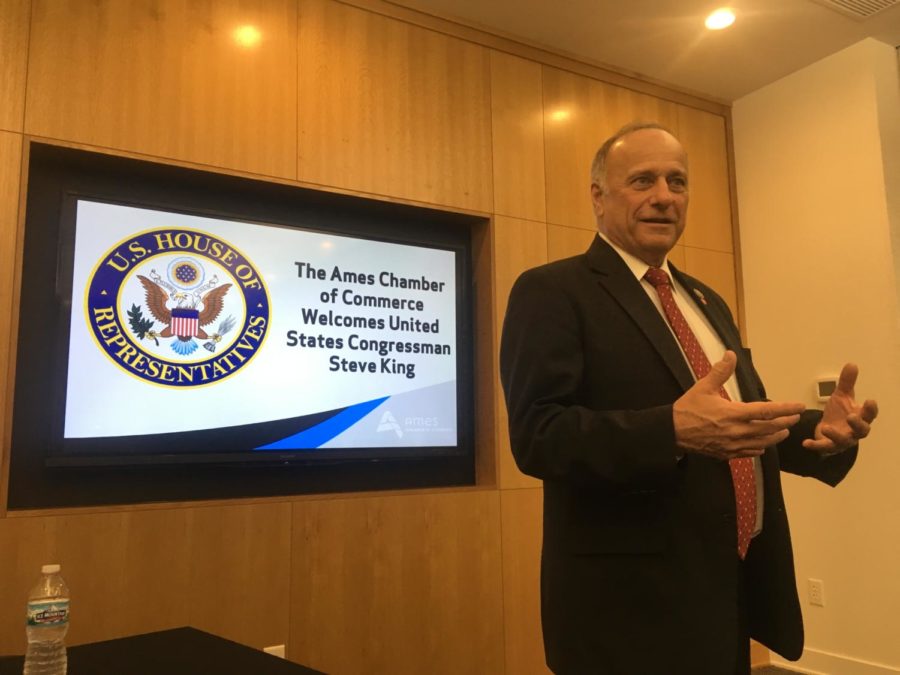Steve King comes to Ames, questions ethics of Joint Committee on Taxation
Congressman King speaks to Ames Chamber of Commerce
November 20, 2017
Congressman Steve King (R-Ia) visited the Ames Chamber of Commerce on Monday to update members on activities in Washington D.C. and field questions.
Much of King’s speech was devoted to the “Tax Cut and Jobs Act” passed in Congress on Nov. 16.
King spoke of his belief that the tax plan will bring money and corporations back from overseas by cutting the corporate tax by 15 percent, saying it is the most important portion of the bill. He also said lowering taxes on money brought to the U.S. that is currently being held in foreign nations with lower tax rates.
The tax plan has been heavily criticized for the majority of benefits being received by the wealthiest in the U.S. According to the Tax Policy Center, 50 percent of the benefits from the tax bill will go the the wealthiest one percent of the nation by 2027.
According to the nonpartisan Joint Committee on Taxation, 22 percent of Americans will actually be paying more in taxes by 2023 under the plan passed in Congress. The increases will largely be the result of the expiration of the “Family Flexibility Credit,” which expires in 2022 under the plan.
King said he had not seen the statistics provided by the Joint Committee on Taxation and when asked if he questions the accuracy and ethics of the committee, his answer was succinct.
“Sure. I’ve dealt with those guys for a long time,” King said.
King alleges that the Joint Committee “won’t speak on its assumptions,” but acts as though they are right simply because they are the Joint Committee on Taxation.
He also spoke of the estate tax, referring to it as a “death tax” and a “tax directly on the American dream.” The estate tax applies only to people with $5.5 million and according to the Tax Policy Center, only an estimated 80 family farms and businesses pay an estate tax.
King conceded that repealing the estate tax will do little to help low and middle-income families and said Americans wanting to tax large estates is “class envy.”
“Every aspect of the tax proposal that’s here doesn’t affect every person. For example, the corporate tax deduction is not going to affect them either,” King said.
However, King said that cutting the corporate tax is the “economic stimulus component” of the “Tax Cut and Jobs Act.”
King said the government taxing an estate is a “socialist idea,” because he believes that taxing the estate limits the freedom of the person being taxed to pass on their wealth to their heirs.
King also discussed Congressman Steve Scalise (R-La) returning, from being shot, to throw out the first pitch at Nationals Park, saying he threw a “perfect strike.” King also spoke of Scalise returning to work to ensure passage of the “Tax Cut and Jobs Act.”
“That tells me something a lot about what that man is that he’ll work really hard to get it right and he’ll burn the clock late at night, early in the morning and do all his homework,” King said.
King said that the GDP has essentially not grown in eight years and said the economy is “stagnant.” King said the GDP has had an average of 1.4 percent growth over the last eight years.
King spoke in support of the North American Free Trade Agreement, or NAFTA, saying he wants to make sure the U.S. stays in the agreement. King feels that NAFTA is beneficial for the U.S. and said he believes the president understands that.
King made a statement about President Donald Trump’s Twitter habits when discussing a phone call he had with the president in which he wanted to speak with him about his concerns first.
“He had other things he wanted to talk about, but what I learned was that as soon as the president gets done saying what he wants to say, he wants to hang the phone up,” King said. “I decided in an instant, I’m gonna talk to him about all the things I want to talk about first and if he hangs up before he gets said what he wants to say, I guess that won’t be so bad, I can read that on Twitter.”
King also spoke about the failed “repeal and replace” effort in Senate and the saga to approval in Congress. King said he felt that the plan to “repeal and replace” was overcomplicated.
“[‘Skinny repeal’] even failed then by one vote, you know, when John McCain went to the floor, timed it for high drama, voted ‘no’ on the bill and we didn’t get it,” King said.
McCain had returned to Washington D.C. on Monday, July 24, before the bill was voted down in the early hours of July 28, less than a week after being diagnosed with brain cancer.
King said he hopes to return to “fixing Obamacare” at some point following tax reform.
Pertinent to Iowans was the Farm Bill that King is involved with that he says will lessen the “regulatory burden” placed on farms. He focused specifically on the “Protect Interstate Commerce Act” that he introduced and relied heavily on an anecdote about cage size requirements for laying hens in California.
“California, for example, is regulating cage size for laying hens in Iowa. They passed a referendum there, you know how they do things in California, they get something on the ballot and then it doesn’t have to be logical but now it’s their constitution. But the referendum required that they double the cage sizes for laying hens in California,” King said.
King noted that if California wants to enact that regulation in California, he has no problem with it. A regulation was also passed stating that eggs sold in California, even if imported from other states, have to follow the same rules for cage sizes.
King related a proposed solution to his time in the construction industry.
“In the construction business, we do things according to plans and specifications. So if you can produce an egg that’s egg-shaped and meets all of the sanitation standards, whatever else might be out there, that’s good enough, you met the plans and specifications,” King said.
While King was implying the process in construction is solely focused on a satisfactory product, bodies like OSHA exist to regulate the safety of the process in achieving such a result.







